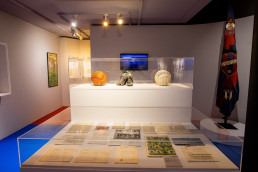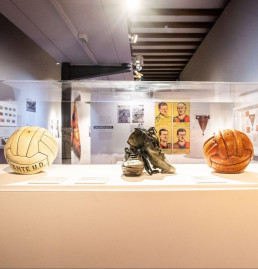The ball of the promotion to the highest category of national football in June 1963, Vall’s boots and the leather with the personalised signatures of the entire squad, which achieved the historic milestone that meant reaching the elite, make up the bulk of the documentation on display in the exhibition ‘DE GRANOTES, GATS I PALMERES, els orígens del Levante UD’ related to the legendary approach of the blue and white squad to the First Division. That Levante, at the same time as the worldwide explosion of beatlemania, came to terms with a history marked by hardship and difficulties. For two seasons, unforgettable for the Levante supporters of that present time, Vallejo’s club walked its skeleton through the most egregious and distinguished stages of professional football. The First Division discovered a horizon hidden from the fleeting glances of the fans who had hardened their Levantine faith between affliction and anguish. It was a kind of seamless oasis from a chronological point of view.
The ball, the boots and the ball with the signatures shine in the final area of the exhibition. This documentation closes the composition of the exhibition, although it is still possible to enter an imaginary time tunnel in order to face, as a farewell, a small film that aims to pay tribute to the Levante of the third millennium from a sporting, but also social and cultural perspective. The current Levante is shown as a multifaceted club in its sporting manifestations with an accentuated commitment to inclusive sport through the Cent Anys Foundation. The ball of the longed-for promotion and the boots were a donation made by the Vall-Barreda family. These are perhaps two of the documents that attract most attention among those attending this exhibition due to their status as a fetish in the history of the club.
The ball is an indelible memory of the events that took place on the afternoon of June 63 in the Vallejo stadium. Quique and Balaguer’s Levante reaffirmed their ties with the First Division after beating Coruña (2-1), as had happened previously in the match played on Galician soil (1-2). Valll clutched the ball in his arms after the final whistle of the referee as the enthusiastic Granotas fans surrounded him and raised him to the Vallejo sky in jubilation. It was not a simple sentence. The attacker shielded the leather at the fans’ request. There are photos, faithfully revealing, of this transit in the direction of the home dressing room. The player lost his Blue and Whites’ shirt on the way, although he kept the ball, which exemplified the magnitude of the success achieved in the spring of ’63, unscathed.
“I was the smart guy who kept the ball.”, Vall pointed out with a smile a few years ago in the documentary ‘El Dia que el Gat pujà a la palmera’ broadcast by the now defunct RTVV. It would be fair to emphasise his historical vision in order to bequeath a piece of his history to the militant Levantinism. We don’t know if it was a deeply meditated action or if, on the contrary, it was an outburst derived from the emotional shock he must have felt after the coronation of that triumph. What is certain is that this manoeuvre has its translation to the present. It is an object that allows us to set our imagination in motion to remember the heartbeat of our ancestors on a major day.
In reality, two balls cohabit in the showcase of promotion. Fernando Aguiló lived the epic that meant the access to the First Division in 1962-1963 from a position of certain preponderance. He himself slips through the tunnel of time to give voice to his memory. “My father, who was also called Fernando Aguiló, was a member of the board chaired by Eduardo Clerigues during the promotion season. Imagine how we lived it all”. How many memories fit in this ball that for decades rested in his private home? It is possible that there are countless. This ball is also the archetype of Levante’s legendary ascent to the Olympus of the Gods. The names of the titans who beat Deportivo La Coruña in the decisive clashes return to their splendour to highlight a feat that youngsters can rediscover. Wanderley, Camarasa, Serafín, Currucale, Quique, Castelló… return to the front line.

